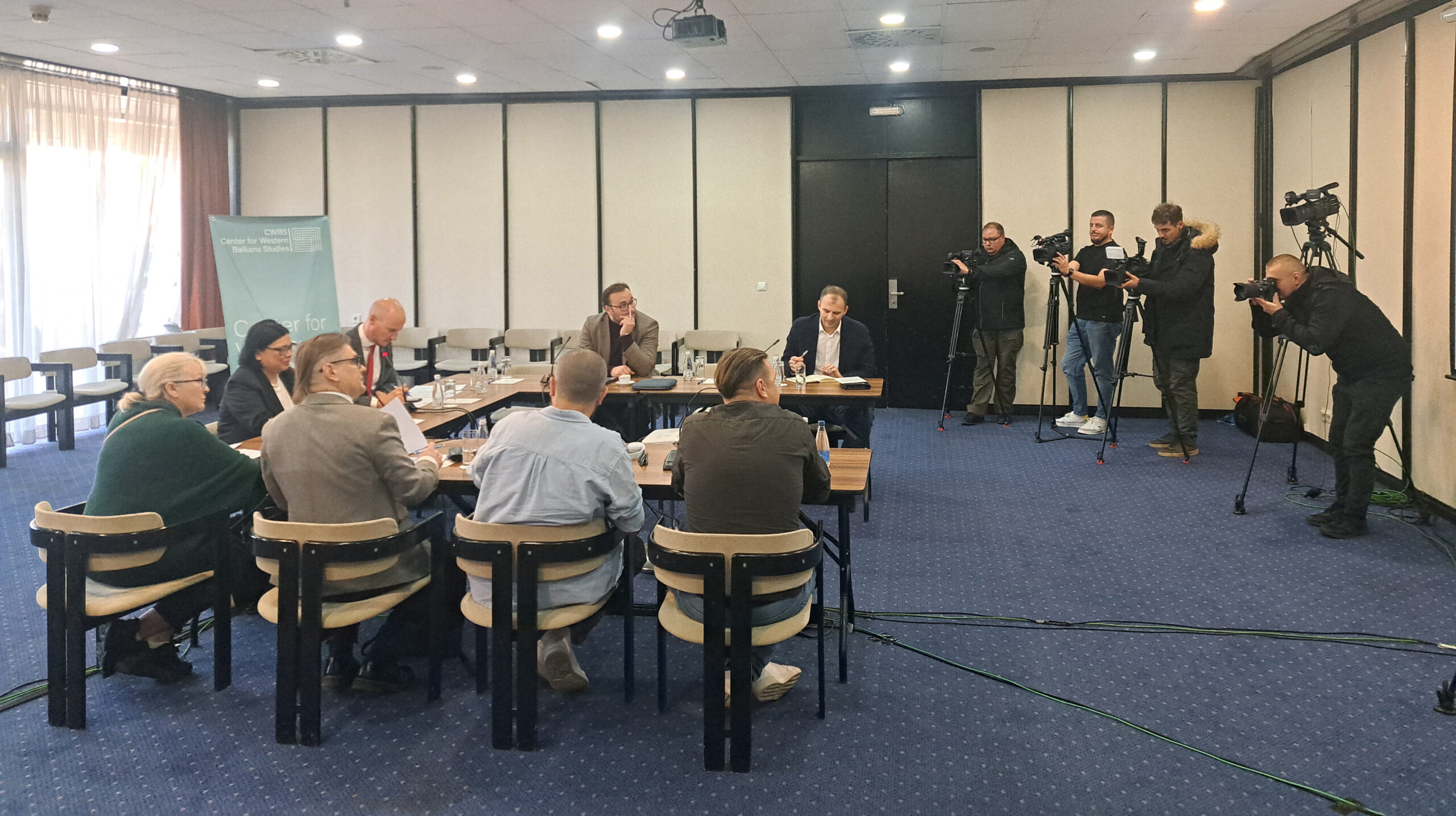During a roundtable in Sarajevo, participants of the discussion sought to analyze the phenomenon of Russian presence in the region. The discussion, moderated by Balša Božović, founder of the Regional Academy for Democratic Development (Serbia), was organized in early October by the Center for Western Balkans Studies (Montenegro).
The latest developments in the region have confirmed and supplemented the views expressed during the meeting.
Shifting Focus: From Humanitarian to Security Threats
Today, in the Western Balkans, it is firmly believed that Russian presence in the region will be limited only to “soft power,” and that “the boot of the Russian occupier” will never step on this land. Primarily, because of the absence of a border with Russia, as well as the mountainous terrain, which complicates the movement of armies. However, even unconventional, non-military means of interference in the region’s affairs can have dangerous consequences.
This was vividly demonstrated by the case of the “Moldovan camps in the Balkans,” in which Russian instructors trained future agents of destabilization to provoke unrest during elections in Moldova. These paramilitary “training centers,” as is known, operated in Serbia and Bosnia and Herzegovina.
During the roundtable, investigative journalists from BIRN Bosnia and Herzegovina, Nino Bilajac and Irvin Pekmez, and Moldovan political scientist Roman Russu presented details of this case.
Many already proven facts confirm that this is a systematic operation of an entire Russian intelligence network. At the same time, in Bosnia and Herzegovina and Serbia, this activity went unaddressed for a long time, until Chisinau’s law enforcement and intelligence services publicly reported it, and journalists conducted investigations.
The use of the Western Balkans as a “base camp” for the preparation of hybrid units primarily demonstrates the region’s vulnerability to Russian special operations, even those with a paramilitary component. The “Moldovan case” clearly demonstrated that Russia has the capacity to create a direct security threat in the region. There are no guarantees that the squads or individual saboteurs trained by Russian instructors are being prepared only for “work” outside the Western Balkans.
This example of the Moldovan camps proves that the essence and format of Russian hybrid influence in the region is shifting from humanitarian to security domains. Participants of the roundtable emphasized the danger of this trend.
Moscow’s Objective: Destabilization and a “New Powder Keg”
The threat of destabilization in the Western Balkans, according to experts, is real, and moreover, this is the main goal of Russia in the region.
As Ukrainian publicist Vitaly Portnikov emphasized, the objective of Moscow’s policy is “to create instability,” “to turn the Balkans into a new powder keg,” in order to “strengthen its foreign policy presence and confront the West.” In the Russian concept of foreign relations, allies are merely instruments, and territories seeking relations with it are springboards for new offensives, he noted.
However, local experts are convinced that Russia will not succeed in driving the region into a new armed conflict.
Reuf Bajrović, Vice President of the U.S.–Europe Alliance (Washington), is convinced that the interests of Russia and those of local elites are diametrically opposed when it comes to the threat of serious destabilization.
“Based on what we have seen from a number of reports and intelligence data that are public, and from public statements, I think the Russians expected that the Serbs as a nation would start some kind of destabilization, which would then give the Russians a chance to have an even deeper influence on the Serbian people,” he said. However, in his view, the objective circumstances on the ground in the Western Balkans are diametrically different from those of the 1990s. Political tools for pursuing interests are acceptable, but nothing more. “You cannot so easily convince the Serbian people to go to Kosovo,” he added.
It can be noted that, probably due to this “memory of war” and the unwillingness to fight another one, the conflict in northern Kosovo, in Banjska, remained a localized clash and did not escalate into something larger. Clearly, the presence of NATO and KFOR forces was the main restraining factor in this case, but the unwillingness of elites and society to push the situation toward combat also plays an important role.
According to Bajrović, Milorad Dodik also faced a choice whether to move toward further escalation.
For a long time, statements by Russian officials and publications in Russian media were aimed at escalating the situation in the Republika Srpska (RS) and in Bosnia and Herzegovina (BiH) as a whole. Moscow strongly supported Dodik in his secessionist aspirations and actions aimed at destabilizing BiH, even to the point of state dissolution and the risk of armed confrontation. However, as recent events in the Republika Srpska have shown, the leader of the Bosnian Serbs and the RS political establishment have refrained from escalation and taken a step back. The decision of the National Assembly of Republika Srpska to withdraw laws and decisions that contradicted the BiH Constitution and were criticized by the West, but actively supported in Moscow, indicates that the Bosnian Serbs—even the most pro-Russian—are not ready to provoke serious conflicts with unpredictable consequences. They too remember the 1990s.
Russian Influence as a Result of Local Elites’ Demand
A non-standard view of Russian presence in the Balkans was presented at the Sarajevo roundtable by Vitaly Portnikov. He is convinced that Russian influence mainly depends on local elites “who sustain its existence.” In his view, after the dissolution of Yugoslavia, it was not only Russia that sought to be present in the region, but local leaders who tried to secure Moscow’s support to strengthen their own positions.
Reuf Bajrović agreed with this opinion, noting that the region had never lived under Russian rule, and that Russian influence in the Western Balkans is the result of the actions of local elites.
As Portnikov emphasized, the leaders of the former Yugoslav republics, primarily Serbia and Montenegro, themselves invited Russia, hoping it would become an ally of their own ambitions and strengthen their positions.
In the recent historical perspective, one can recall Milo Đukanović and his active involvement of Russian money in Montenegro’s economy.
Today, Belgrade and Serbian leader Aleksandar Vučić act as Russia’s main partners in the region. Until just a few days ago, the name of Milorad Dodik could be mentioned alongside Vučić’s, but his retreat in Republika Srpska signals a change in the situation. Vučić remains, and he needs several crucial things from his Russian friends.
First – blocking the recognition of Kosovo’s independence in the Security Council, i.e. in the UN. Second – the cheap gas. There are other matters, but these two are key, as failure in the first would guarantee the political collapse of the current Serbian authorities, and in the second, a crisis in the Serbian economy.
When the interests of local Balkan elites coincide with those of the Russians, productive cooperation follows, as in the case of blocking Kosovo’s recognition.
When their interests diverge, overt or covert conflict and crisis emerge.
In Montenegro, with Đukanović, it reached a complete rupture of relations and an attempted violent overthrow of former “partners” — a “coup d’état” aimed at preventing the country’s accession to NATO.
Serbia risks an energy crisis: first, because the Russian side refuses to sell NIS to Serbian (or other non-sanctioned) owners, putting the supply of petroleum products at risk; second, because the Kremlin has refused to sign a long-term gas supply contract (as the Russians likely decided that short-term gas arrangements serve as a guarantee against the nationalization of the “Petroleum Industry of Serbia”).
Serbia as a Stronghold of Russian Influence
Political scientist Boris Varga from Novi Sad spoke in detail during the roundtable about the situation in Serbia and its role in spreading Russian influence.
“Russia and Serbia remain the main destabilizing factors in the region,” he emphasized, adding that “Serbia is simultaneously both the source and the channel of this influence.”
The Serbian political scientist expressed indignation that European institutions display a lack of interest in the region, which threatens the rollback of democracy, the rise of authoritarian tendencies, and creates room for Russia’s strengthening.
He particularly expressed outrage that the EU does not oppose Vučić’s authoritarianism, does not care about the rollback of democracy, does not support the just demands of protesters, does not emphasize the need for fair elections, and does not require the imposition of sanctions against Russia as a prerequisite for European integration.
However, this position of non-intervention has apparently already been reconsidered — just a few days after Varga’s remarks in Sarajevo, the European Parliament adopted the most severe resolution on Serbia, demanding adherence to democratic norms and the imposition of sanctions against the Russian Federation.
Whether Brussels will indeed succeed in adjusting Serbia’s policy remains to be seen. But at the very least, the EU has demonstrated that it no longer tolerates and will not tolerate Belgrade’s authoritarian and pro-Russian course.
The Multi-Vector Nature of Russian Influence: Not Only Belgrade
The EU’s prolonged tolerance toward the Serbian government’s cooperation with Russia has led to Serbia effectively turning into a stronghold of Russian influence — an intermediary through which Moscow pursues its objectives in the region. However, during the roundtable, experts warned against perceiving Belgrade as the sole “Russian regional hub.”
According to experts, there are many “portals” through which Russia exerts its influence in the region.
On one hand, certain regional politicians maintain direct contact with Russian leaders without Belgrade’s mediation. The main such interlocutor is Milorad Dodik, who since 2022 has met with Putin at least six times.
Furthermore, Republika Srpska itself has become a significant center for the dissemination of Russian influence.
Bosnian journalists and experts emphasized that Republika Srpska currently functions as an important hub of Russian presence in the region — both unofficial and official. Even the diplomatic representation in Bosnia and Herzegovina carries out its activities primarily not in the capital, Sarajevo, but in East Sarajevo (Republika Srpska), while in Banja Luka, an office of the Russian Embassy in BiH has been opened with an unclear legal status.
An interesting fact mentioned during the discussion was that since 2022, the staff of the Russian Embassy in Sarajevo has significantly increased, mainly with diplomats expelled from other countries for espionage or security concerns.
On the other hand, speakers, including Bosnian political scientist Omar Memišević, recalled the strong Hungarian influence in the region, which in many aspects can be interpreted as an extension of Russian influence.
Conclusions
- Russian influence in the Western Balkans remains multi-vector and hybrid but shows a tendency to shift into the security sphere (Russian paramilitary camps for Moldovan citizens in Serbia and Bosnia and Herzegovina).
- The region maintains resilience against destabilization due to the memory of the wars of the 1990s and the unwillingness to provoke a new military conflict, yet the threat remains real due to frozen conflicts and external (Russian) influence aimed at inflaming regional divisions.
- Local elites play a key role in either maintaining or restraining Russian influence. It is precisely the regional demand for Russian presence that determines the scale of Russia’s involvement in the region’s affairs.
- EU policy toward the region must take into account the danger of Russian influence spreading. The European Union is now beginning to revise its policy toward Serbia, which may become an important step toward reducing Belgrade’s role as a Russian stronghold in the Western Balkans.
- Republika Srpska is the second, after Belgrade, center of Russian influence in the region. The recent developments in RS and Dodik’s retreat from escalation create an opportunity to reduce Russia’s influence over RS, BiH, and the region as a whole.
- Accusations against Hungary of being “Moscow’s agent” in the Balkans must be seriously examined within the EU, but above all within NATO.
CWBS Analytical Group



